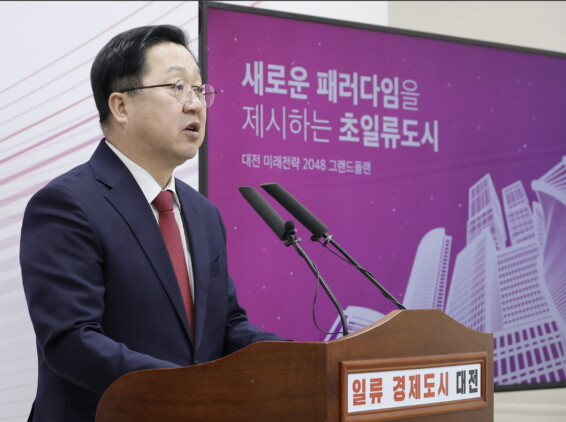
SEOUL - Daejeon Metropolitan City Mayor Lee Jang-woo has passionately advocated for the administrative integration of Daejeon and South Chungcheong Province, asserting that it represents a pivotal challenge to enhance national competitiveness and prepare South Korea for the next century.
Speaking at the 'Culture Policy Forum 2025' held at the National Assembly Members' Office Building on March 25th, Mayor Lee stated, "The administrative integration of Daejeon and South Chungcheong is not merely a reorganization of administrative districts, but a new challenge to elevate national competitiveness and prepare the Republic of Korea for the next 100 years."
The forum, co-hosted by the Munhwa Ilbo newspaper and National Assemblyman Sung Il-jong, brought together experts in local administration and balanced development, including Woo Dong-ki, Chairman of the Presidential Committee on Local Autonomy and Balanced Development. The central theme of the forum was 'Daejeon·Chungnam Integration and the Path of the Republic of Korea.' Mayor Lee took the opportunity to elaborate on his vision and plans for the proposed Daejeon-Chungnam Special Metropolitan City (tentative name), urging the formation of a national consensus on the matter.
In his address, Mayor Lee traced the historical trajectory and urban growth of Daejeon and South Chungcheong. "Daejeon marked a turning point a century ago when the South Chungcheong Provincial Office relocated here, establishing it as an administrative hub. Subsequently, through railways, highways, and the Daedeok Science Town, it has grown into South Korea's science capital," he explained. However, he cautioned, "Faced with the reality of metropolitan concentration and regional decline, both Daejeon and South Chungcheong can no longer expect survival and progress under a fragmented system."
He further emphasized the interconnectedness of the region, stating, "Daejeon and South Chungcheong constitute a living sphere where economy, science, and administration are closely linked, essentially functioning as a single city. It is now time to institutionally integrate them and maximize the synergistic effects of administrative, fiscal, and industrial collaboration."
Mayor Lee proposed a bold devolution of authority, including significant autonomy in budgeting and personnel management, to establish the integrated metropolitan entity at a level comparable to a quasi-federal government.
He highlighted the potential scale of the integrated metropolis, projecting a population of 3.57 million and a regional gross domestic product (GRDP) of 197 trillion won, positioning it as the third-largest in South Korea. This scale surpasses that of Busan Metropolitan City and would rank it 32nd in population and 23rd in GRDP among 49 European countries, signifying its global significance.
"We must now become a community that grows together, rather than simply competing cities. The combination of Daejeon's science and technology prowess and South Chungcheong's industrial infrastructure can generate new growth engines for South Korea," Mayor Lee asserted, underscoring the potential for realizing 'economies of scale' through integration.
He also outlined a blueprint to cultivate the integrated special metropolitan city as a hub for the convergence of national strategic industries, centered on the 'ABCD+QR' sectors (Artificial Intelligence, Bio, Carbon Neutrality, Defense + Quantum, Robotics, etc.).
To ensure balanced development within the special metropolitan city, Mayor Lee presented a triangular three-axis development strategy encompassing the Daejeon area, the northern area, and the western area. This strategy aims to establish a multi-polar system within the metropolis by building broad living and economic spheres connecting the central cities with neighboring counties. He added that the plan includes establishing a wide-area transportation network, promoting industry-specific strategies tailored to each region, and installing resident-friendly infrastructure to create thriving local living and economic zones.
In closing, Mayor Lee Jang-woo declared, "The integration of Daejeon and South Chungcheong is not just a simple administrative merger. It is a national strategy that will change the future of South Korea and a starting point for a new era where the regions once again take center stage. Now is the time for action. Together with our citizens, we will surely turn this challenge into reality."
[Copyright (c) Global Economic Times. All Rights Reserved.]






























